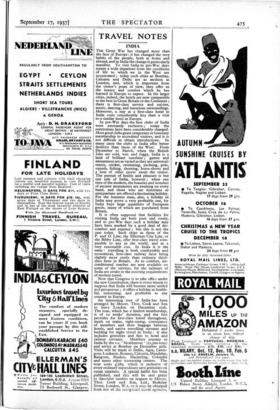TRAVEL NOTES
INDI A Tan Great War has changed more than the face of Europe : it has changed the very habits of the people, both at home and abroad, and in India the change is particularly manifest. To visit India in pre-War days meant a wide departure from the conditions of life to which we in the West are accustomed; such cities as Bombay,
and d Delhi are as modern as London, and, which is important from the visitor's point of view, they offer us the luxury and comfort which he has learned in Europe to expect. In the larger cities, indeed, the hotels are now comparable to the best in Great Britain or the Continent ; there is first-class service and cuisine, music, dancing, and luxurious surroundings. Moreover, a stay at a first-class hotel in India costs considerably less than a visit to a similar hotel in Europe.
In pre-War days the best clubs of India were extremely exclusive ; today the restrictions have been considerably changed. Most good clubs grant temporary or honorary membership to accredited visitors, and it is not difficult to obtain introductions. In many cases the clubs in India offer better faciliti:s than those of the West. From December to March, when the British Isles are cold, wet, and foggy, India is a land of brilliant sunshine ; games and amusement are as varied as they are universal: tennis, cricket, swimming, yachting, polo, squash, fishing, shooting, horse-shows and a host of other sports await the visitor. The pursuit of health and pleasure is but one side of India, however ; when one tires of the modem, the beauties and wonders of ancient monuments are awaiting on every hand, and those who are historians or antiquarians are offered a fascinating holiday. For the business man, also, a holiday in India may prove a very profitable one, for India buys large quantities of European goods, many of which are purchased from Britain.
It is often supposed that facilities for visiting India are both poor and costly, and in pre-War days such a holiday may have been marked by a good deal of dis- comfort and expense ; but this is not the case today. Such ships as those of the P. and 0. Line, the Ellerman City Line, or the Bibby Line, offer first-class travel com- parable to any in the world, and at a very reasonable cost. In India it is the same : travelling is both comfortable and economical, first-class railway fares being slightly more costly than ordinary third- class fares in Britain. As to comfort, air- conditioned coaches are now available on some of the services, for the railways of India are awake to the exacting requirements of modern travel.
Now that Congress is to take office under the new Constitution, there is every reason to suppose that India will become more settled and prosperous ; it offers a holiday as health- ful, interesting, and profitable as any country in Europe.
An interesting tour of India has been arranged by Messrs. Thos. Cook and Son
to leave London on December roth. The tour, which has a limited membership, is of so weeks' duration, and the fare provides for first-class travel throughout, meals on trains, sight-seeing, conveyance of members and their baggage between hotels, and native travelling servants and bedding for night travel in India : it also includes gratuities and fees to hotel and railway servants. Members journey to India by the s.s. Strathnaver ' (22,5oo tons) and arrive at Bombay on December 3oth. Visits will be made to Delhi, Agra, Cawn- pore, Lucknow, Bcnares, Calcutta, Mandalay, Rangoon, Madras, Darjeeling, Colombo and many other interesting centres. The tour costs L389, which is inclusive of every ordinary expenditure save gratuities on ocean steamers. A special leaflet has been published, and this will be sent gratis to Spectator readers on request to Mcssrs. Thos. Cook and Son, Ltd., Berkeley Street, London, W. r, or it may be obtained from any of the recognised travel agencies.










































 Previous page
Previous page